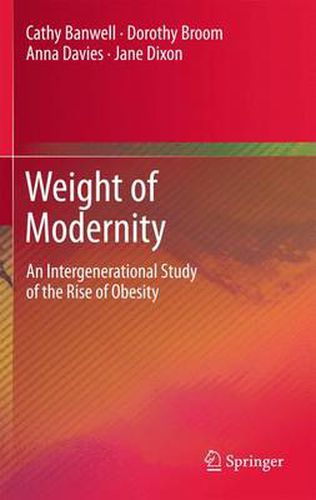Readings Newsletter
Become a Readings Member to make your shopping experience even easier.
Sign in or sign up for free!
You’re not far away from qualifying for FREE standard shipping within Australia
You’ve qualified for FREE standard shipping within Australia
The cart is loading…






This title is printed to order. This book may have been self-published. If so, we cannot guarantee the quality of the content. In the main most books will have gone through the editing process however some may not. We therefore suggest that you be aware of this before ordering this book. If in doubt check either the author or publisher’s details as we are unable to accept any returns unless they are faulty. Please contact us if you have any questions.
Over a half of adults in the US, Canada, Australia and numerous European countries are now overweight or obese, a proportion that has risen sharply in the past two decades. Dominant biomedical explanations focus on the energy equation - an imbalance between energy intake and expenditure - and remedies focus on motivating individuals to restore the balance by eating better and being more active, or - in extreme cases - surgical intervention. This book offers a perspective that sees increasing obesity as a social phenomenon as well as a public health problem. It contains detailed accounts of three generations of Australians’ experiences of changing environments and the emergence of social trends such as increasing availability of convenience foods, the individualisation and commercialisation of leisure, car reliance, and busyness. Participants’ narratives are interwoven with sociological and historical analyses of changes to show how contemporary Australians are experiencing and adapting to dramatic socio-cultural and environmental changes that are reshaping their lives and, in many cases, their bodies. The book demonstrates that obesity is an unintended consequence of economic development accompanied by profound socio-cultural changes, and by identifying the key developments the authors propose leverage points. While the research was conducted in Australia, the fundamental drivers of rapid weight gain are equally present in other modern, secular societies.
$9.00 standard shipping within Australia
FREE standard shipping within Australia for orders over $100.00
Express & International shipping calculated at checkout
This title is printed to order. This book may have been self-published. If so, we cannot guarantee the quality of the content. In the main most books will have gone through the editing process however some may not. We therefore suggest that you be aware of this before ordering this book. If in doubt check either the author or publisher’s details as we are unable to accept any returns unless they are faulty. Please contact us if you have any questions.
Over a half of adults in the US, Canada, Australia and numerous European countries are now overweight or obese, a proportion that has risen sharply in the past two decades. Dominant biomedical explanations focus on the energy equation - an imbalance between energy intake and expenditure - and remedies focus on motivating individuals to restore the balance by eating better and being more active, or - in extreme cases - surgical intervention. This book offers a perspective that sees increasing obesity as a social phenomenon as well as a public health problem. It contains detailed accounts of three generations of Australians’ experiences of changing environments and the emergence of social trends such as increasing availability of convenience foods, the individualisation and commercialisation of leisure, car reliance, and busyness. Participants’ narratives are interwoven with sociological and historical analyses of changes to show how contemporary Australians are experiencing and adapting to dramatic socio-cultural and environmental changes that are reshaping their lives and, in many cases, their bodies. The book demonstrates that obesity is an unintended consequence of economic development accompanied by profound socio-cultural changes, and by identifying the key developments the authors propose leverage points. While the research was conducted in Australia, the fundamental drivers of rapid weight gain are equally present in other modern, secular societies.